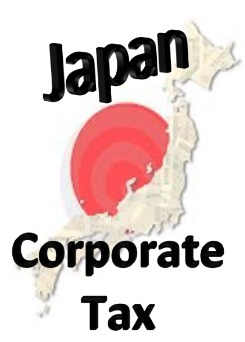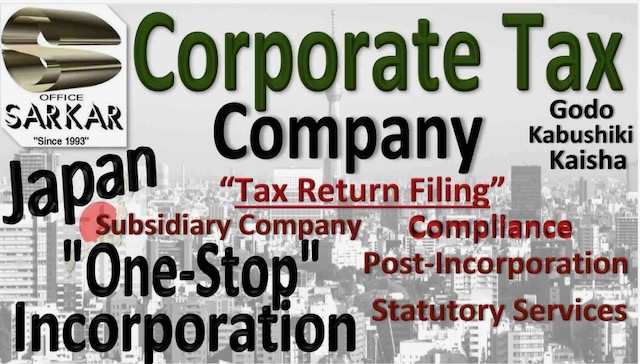Sarkar Office Japan KK
Consulting & Administrative Legal Services
Japan "One-Stop Solution" Since 1993
Branch, Subsidiary Company (KK, GK) Registration
Statutory Compliance (Tax, Social Insurance, etc.)

Consulting & Administrative Legal Services
Japan "One-Stop Solution" Since 1993
Branch, Subsidiary Company (KK, GK) Registration
Statutory Compliance (Tax, Social Insurance, etc.)

Japanese Corporate Tax System, Rates in Japan - Branch Office and Subsidiary Company - At a Glance
The neutrality of the tax system concerning the mode of business presence (branch or subsidiary): Corporations (business entities) engaged in economic activities in Japan are subject to taxes in Japan on the profits generated by those economic activities.
The income of corporations established in Japan is, as a rule, except for certain non-taxable and tax-exempt income, subject to taxation, regardless of where it was generated (i.e., the income source of the country). When income includes profits earned overseas and taxed at the source, foreign tax credits are available against Japanese taxes owed to the double taxation treaty between the country of income source and Japan.
.jpeg)
Branch Office of foreign corporations
Regarding branch offices of foreign corporations, measures such as only certain income being subject to taxation in Japan have been implemented to avoid international double taxation in Japan. The scope of taxable income of the Branch Office has significantly changed from the business year commencing on or after April 1, 2016. Branch Offices and the Head Office (parent company) shall be deemed independent corporations and subject to taxation.
Profits/losses from internal transactions between the Japanese branch and head office will be recognized based on the presumption that transactions are conducted at arm's length prices. The Japanese branch office (permanent establishment) is taxable in the third country; foreign tax credits are available, and taxes paid in the third country may be credited within certain bounds against Japanese taxes owed to avoid international double taxation.
Representative Office:
Representative offices through which a foreign corporation engages in business in Japan are not supposed to derive any income subject to corporation tax from publicity/advertising, information provision, market surveys, preliminary study and other activities auxiliary to its business performance.
Establishment of a Japanese Company or Branch Office in Japan and post-registration mandatory Tax-office notification (National and Local Tax office):
Per Japanese law, when a “Japanese Company” or a “Branch Office” is newly established and registered in Japan, tax notification about the start-up must be submitted to tax authorities within a prescribed period after establishment.

Corporate Income Tax : The taxes levied in Japan on income generated by the activities of a corporation include: The below taxes are collectively referred to as "Corporate Taxes."
Tax Rates: (Japan Corporate Income Tax) (Tax rates will vary based on the starting date of the business year)
Taxable Income Bracket |
Up to 4M Yen |
4M to 8M Yen |
Over 8M Yen |
Corporate Tax |
15.00% |
15.00% |
23.20% |
Local Corporate Tax |
1.55% |
1.55% |
2.39% |
Corporate Inhabitant Taxes |
|
|
|
Prefecture Inhabitant Tax |
0.15% |
0.15% |
0.23% |
Municipal Inhabitant Tax |
0.90% |
0.90% |
1.39% |
Enterprise Tax |
3.50% |
5.30% |
7.00% |
Special Corporate Enterprise Tax |
1.30% |
1.96% |
2.59% |
TOTAL TAX RATE |
22.40% |
24.86% |
36.80% |
** The above Tax rates (Corporate Inhabitant and Enterprise Tax) are examples of Small and Medium Sized enterprises (SMEs based in Tokyo. SME: Paid-in capital is 100 million yen or less; annual corporate tax amount 10M yen or less; annual taxable income 25M yen or less.
Corporate Inhabitant tax
Corporate Inhabitant taxes are levied not only on income but also on a per capita basis, using the corporation's capital and the number of its employees as the tax base. Corporate Inhabitant tax is mandatory irrespective of the profit and loss result in the company's financial year.
Enterprise Tax
Corporations with capital exceeding 100M yen are taxed on a pro forma basis using income, added value, and capital as the taxable base.
Calculation of income subject to Corporate tax: The amount of income used as the tax base for corporate taxes on income for each taxable year is determined by making the necessary tax adjustments to corporate profits calculated using accounting standards generally accepted as fair and appropriate. Costs and expenses incurred in earning profits are deductible, except in certain exceptional instances.
Treatment of losses: Net losses under income in each business year are carried forward for the next nine (9) years (or ten years in the case of losses arising during the business years beginning on or after April 1, 2018). Losses may only be carried forward if a Blue Form Tax Return is filed for the business year in which the loss arose, and a final tax return is filed every subsequent year.
Filing of Corporate tax return and Payment of Corporate taxes: Corporations must file a Final Tax Return for corporate tax, local corporate tax, corporate inhabitant tax, enterprise tax, and special local corporate tax on their income within two (2) months from the day following the last day of each fiscal/taxable year. However, an extension of the deadline for filing a final tax return may be requested, with prior approval from the director of the taxation office, when a corporation cannot file a final tax return because of unavoidable acceptable reasons. A Japanese Company or Branch Office must file a corporate tax return even in the case of "Nil Return."
Tax treaties: Japan has concluded tax treaties with many countries to avoid double taxation of income internationally and prevent tax evasion. The provisions of tax treaties supersede those of domestic law. Japan's Tax Convention Network website link from Ministry of Finance (MOF)
Consumption tax: In principle, the Consumption Tax (VAT) Rate is 10% (inclusive of a local consumption tax rate of 2.2%). The tax rate of 8% (inclusive of a local consumption tax rate of 1.76%) is applied to sales of food and beverages, except alcoholic drinks, dining out, etc.
New Japanese Invoice System - Qualified Invoice Issuers:
From October 1, 2023, the new invoice system will start as a method of purchase tax credit for consumption tax. "Qualified invoices" can only be issued by "Qualified Invoice Issuers." For the Seller to issue a Qualified Invoice, it must be registered as a "Business Issuer of Qualified Invoice" by the District Director of the Tax office of jurisdiction by Mar-31-2023. What is a registration number? Taxable Business operator with a Corporate Number "T" (Roman letter) + Corporate number (13 digits). For further details, download "Outline of the Invoice System" from the NTA site.
For Corporate Tax Return filing and other matters related to Company Tax, please get in touch with us with a detailed inquiry.
For more details, please download the file. 
Types of Companies in Japan (Business Establishment)
Japanese Company (KK or GK) Incorporation
Kabushiki Kaisha (KK) Opening Form & Documents
Godo Kaisha (GK) Opening Procedure, Steps and Flow Chart
Godo Kaisha (GK) Opening Form & Documents
Japan Branch Office Opening Form & Documents
Japan Subsidiary Company Closing Steps and Procedure
Proprietorship Business Closure
Corporate Number (NTA)
Japan Tax (NTA)
Income Tax Guide (NTA)
My Number (Japan)
Social Insurance (Japan)
Immigration Bureau (Japan)
Japan Visa (MOFA)